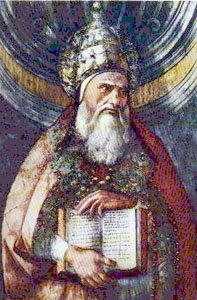 Simple (1954 Calendar): July 11
Simple (1954 Calendar): July 11Commemoration (1962 Calendar): July 11
Pope St. Pius I was the tenth pope of the Holy Catholic Church from c. 140 - 154 AD. His feastday is traditionally observed on July 11th. Unfortunately, it was removed from the Novus Ordo calendar like far too many other saints after the Second Vatican Council.
St. Pius I is remembered as the pope that helped build the Church of St. Pudenziana in Rome. He is rumored to have been the brother of the author of The Shepard of Hermas, which was considered canonical (on the same level as Scripture although it was not part of the Bible).
He died in c. 154 AD and is considered a martyr, which is an unproven assertion. The papacy of Pope St. Pius I also saw the rise of one of the greatest heretics in human history - Marcion of Sinope, who said that the Old Testament God was not the same as the New Testament God. He also formed his own Bible consisting of the Gospel of St. Luke and some of St. Paul's letters, but he modified them to exclude all references to Jesus fulfilling Old Testament prophecy. The Catholic Encyclopedia says of the Marcionites: "they were perhaps the most dangerous foe Christianity has ever known."
Pope St. Pius I was the tenth pope of the Holy Catholic Church from c. 140 - 154 AD. His feastday is traditionally observed on July 11th. Unfortunately, it was removed from the Novus Ordo calendar like far too many other saints after the Second Vatican Council.
St. Pius I is remembered as the pope that helped build the Church of St. Pudenziana in Rome. He is rumored to have been the brother of the author of The Shepard of Hermas, which was considered canonical (on the same level as Scripture although it was not part of the Bible).
He died in c. 154 AD and is considered a martyr, which is an unproven assertion. The papacy of Pope St. Pius I also saw the rise of one of the greatest heretics in human history - Marcion of Sinope, who said that the Old Testament God was not the same as the New Testament God. He also formed his own Bible consisting of the Gospel of St. Luke and some of St. Paul's letters, but he modified them to exclude all references to Jesus fulfilling Old Testament prophecy. The Catholic Encyclopedia says of the Marcionites: "they were perhaps the most dangerous foe Christianity has ever known."
Traditional Matins Reading:
Pius, the first of this name, a citizen of Aquileia, and son of Rufinus, was priest of the holy Roman Church. During the reign of Antoninus Pius and Marcus Aurelius he was chosen Sovereign Pontiff. In five ordinations which he held in the month of December, he ordained twelve bishops and eighteen priests. Several admirable decrees of his are still extant; in particular that which ordains that the Resurrection of our Lord is always to be celebrated on a Sunday. He changed the house of Pudens into a church, and because it surpassed the other titles in dignity, inasmuch as the Roman Pontiffs had made it their dwelling-place, he dedicated it under the title of Pastor. Here he often celebrated the holy mysteries, baptized many who had been converted to the faith, and enrolled them in the ranks of the faithful. While he was thus fulfilling the duties of a good shepherd, he shed his blood for his sheep and for Christ the Supreme Pastor, being crowned with martyrdom on the fifth of the Ides of July. He was buried in the Vatican.
Collect:
O Eternal Shepherd, who appointed blessed Pius I shepherd of the whole Church, let the prayers of this martyr and supreme pontiff move You to look with favor upon Your flock and to keep it under Your continual protection. Through our Lord . . .








0 comment(s):
Mag-post ng isang Komento